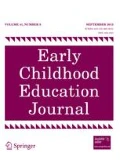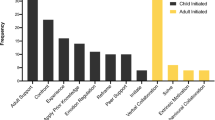Abstract
The transition to kindergarten is a critical milestone in children’s lives, with implications for academic and future life success. The demographic family/parental variables of residence, social class, and race have been associated with children’s adjustment to kindergarten. In particular, children growing up in families from urban, low-income African American backgrounds are at heighted risk for negative academic, cognitive, and socio-emotional outcomes as they transition to kindergarten. Relatively little inductive research exists on the kindergarten transition of this population and how families from urban, low-income African backgrounds positively support their children’s kindergarten adjustment. However, researchers using qualitative methods are increasingly examining the first-hand experiences of families from urban, low-income African American backgrounds to better understand family beliefs and practices that promote children’s successful kindergarten transition. Contributing to this gap in the literature, we utilized qualitative interviews informed by resilience theory to explore how 20 mothers from urban, low-income African American backgrounds facilitated their Head Start preschoolers’ transition to kindergarten. We found that, despite possessing parental/family risk factors associated with ineffective kindergarten transitions, mothers monitored and assessed their children’s academic and socio-emotional school readiness abilities, promoting readiness competencies while addressing readiness weaknesses. One of the ways that mothers supported children’s transition readiness was through one-on-one conversations with preschoolers. Our findings provide recommendations for effective home–school collaborations that support children’s successful kindergarten transition. Collaborating with engaged and motivated parents, Head Start can assist families and children prior to kindergarten and continue to serve as a link between families and children and elementary schools.
Similar content being viewed by others
Notes
Pseudonym for Head Start program.
Pseudonym for neighborhood.
References
Abenavoli, R. M. et al. (2015). Parent support for learning at school entry: Benefits for aggressive children in high-risk urban contexts. Early Childhood Research Quarterly, 31, 9–18.
Barbarin, O. A., Early, D., Clifford, R., Bryant, D., Frome, P., Burchinal, M., & Pianta, R. (2008). Parental conceptions of school readiness: Relation to ethnicity, socioeconomic status, and children’s skills. Early Education and Development, 19(5), 671–701.
Bazeley, P., & Jackson, K. (Eds.). (2013). Qualitative data analysis with NVivo. Thousand Oaks, CA: Sage.
Belfield, C., & Garcia, E. (2014). Parental notions of school readiness: How have they changed and has preschool made a difference? The Journal of Educational Research, 107(2), 138–151.
Bierman, K. L., Welsh, J. A., Heinrichs, B. S., Nix, R. L., & Mathis, E. T. (2015). Helping Head Start parents promote their children’s kindergarten adjustment: The Research-Based Developmentally Informed Parent Program. Child Development, 86(6), 1877–1891.
Bono, K. E., Sy, S. R., & Kopp, C. B. (2016). School readiness among low-income Black children: Family characteristics, parenting, and support. Early Child Development and Care, 186(3), 419–435.
Brantlinger, E., Jimenez, R., Klingner, J., Pugach, M., & Richardson, V. (2005). Qualitative studies in special education. Exceptional Children, 71(2), 195–207.
Charmaz, K. (2003). Grounded theory: Objectivist and constructivist methods. In N. K. Denzin & Y. S. Lincoln (Eds.), Strategies for qualitative inquiry (pp. 249–291). Thousand Oaks, CA: Sage.
Cresswell, J. W. (2007). Qualitative inquiry and research design. Thousand Oaks, CA: Sage.
Dickerson, B. (1995). African American single mothers: Understanding their lives and families. Thousand Oaks, CA: Sage.
Early, D. M., Pianta, R. C., Taylor, L. C., & Cox, M. J. (2001). Transition practices: Findings from a national survey of kindergarten teachers. Early Childhood Education Journal, 28(3), 199–206.
Eckert, T. L., McIntyre, L. L., DiGennaro, F. D., Arbolino, L., Begeny, J., & Perry, L. J. (2008). Researching the transition to kindergarten for typically developing children: A literature review of current processes, practices, and programs. In D. H. Molina (Ed.), School Psychology: 21st century issues and challenges (pp. 235–252). Hauppauge: Nova Science Publishers.
Galper, A., Wigfield, A., & Seefeldt, C. (1997). Head Start parents’ beliefs about their children’s abilities, task values, and performances on different activities. Child Development, 68(5), 897–907.
Gill, S., Winters, D., & Friedman, D. S. (2006). Educators’ views of pre-kindergarten and kindergarten readiness and transition practices. Contemporary Issues in Early Childhood, 7(3), 213–227.
Harper, L. J. (2015). Supporting young children’s transitions to school: Recommendations for families. Early Childhood Education Journal, 44(6), 653–659.
Hill, C. E., Knox, S., Thompson, B. J., Williams, E. N., Hess, S. A., & Ladany, N. (2005). Consensual qualitative research: An update. Journal of Counseling Psychology, 52(2), 196–205.
Hill, R. B. (2003). The strengths of Black families. Lanham, NY: University Press of America.
Hollingsworth, L. D. (2013). Resilience in Black families. In B. H. Wasik (Ed.), Handbook of family resilience (pp. 229–243). Mahwah, NJ: Routledge.
Iruka, I. U., Gardner-Neblett, N., Matthews, J. S., & Winn, D. M. C. (2014). Preschool to kindergarten transition patterns for African American boys. Early Childhood Research Quarterly, 29(2), 106–117.
Jarrett, R. L., & Coba-Rodriguez, S. (2017). We keep the education goin’ at home all the time: Family literacy in low-income African American families of preschoolers. Journal of Education for Students Placed at Risk, 22(2), 57–76. doi:10.1080/10824669.2017.1295861.
Jarrett, R.L., Jefferson, S.R. & Kelly, J.N. (2010). Finding community in family: Neighborhood effects and African American extended kinship networks. Journal of Comparative Family Studies, 41(3), 177–187. http://www.jstor.org/stable/41604360.
Jarrett, R. L., Sensoy Bahar, O., & Taylor, M. A. (2011). Holler, run, be loud: Management strategies to promote child physical activity in a low-income, African American neighborhood. Journal of Family Psychology, 25(6), 825–836. doi:10.1037/a0026195.
Krumer-Nevo, M. (2005). Listening to ‘life knowledge:’ A new research direction in poverty studies. International Journal of Social Welfare, 14(2), 99–106.
La Paro, K. M., Kraft-Sayre, M., & Pianta, R. C. (2003). Preschool to kindergarten transition activities: Involvement and satisfaction of families and teachers. Journal of Research in Childhood Education, 17(2), 147–158.
Lincoln, Y., & Guba, E. (1985). Naturalistic inquiry. Thousand Oaks, CA: Sage.
LoCasale-Crouch, J., Mashburn, A. J., Downer, J. T., & Pianta, R. C. (2008). Pre-kindergarten teachers’ use of transition practices and children’s adjustment to kindergarten. Early Childhood Research Quarterly, 23(1), 124–139.
Lofland, J., Snow, D., Anderson, L., & Lofland, J. (2005). Analyzing social settings: A guide to qualitative observation and analysis. Belmont, CA: Wadsworth.
Logan, S. L. E. (1996). The Black family: Strengths, self-help, and positive change. Boulder, CO: Westview.
Malsch, A. M., Green, B. L., & Kothari, B. H. (2011). Understanding parents’ perspectives on the transition to kindergarten: What early childhood settings and schools can do for at-risk families. Best Practices in Mental Health, 7(1), 47–66.
McAllister, C. L., Wilson, P. C., Green, B. L., & Baldwin, J. L. (2005). “Come and take a walk”: Listening to Early Head Start parents on school-readiness as a matter of child, family, and community health. American Journal of Public Health, 95(4), 617–625.
McIntyre, L. L., Eckert, T. L., Fiese, B. H., DiGennaro, F. D., & Wildenger, L. K. (2007). Transition to kindergarten: Family experiences and involvement. Early Childhood Education Journal, 35(1), 83–88.
McWayne, C., Fantuzzo, J., Cohen, H. L., & Sekino, Y. (2004). A multivariate examination of parent involvement and the social and academic competencies of urban kindergarten children. Psychology in the Schools, 41(3), 363–377.
Miles, M. B., & Huberman, A. M. (1994). Qualitative data analysis: An expanded sourcebook. Thousand Oaks, CA: Sage.
Miller, K. (2015). The transition to kindergarten: How families from lower-income backgrounds experienced the first year. Early Childhood Education Journal, 43(3), 213–221.
Mistry, R. S., Benner, A. D., Biesanz, J. C., Clark, S. L., & Howes, C. (2010). Family and social risk, and parental investments during the early childhood years as predictors of low-income children’s school readiness outcomes. Early Childhood Research Quarterly, 25(4), 432–449.
Office of Head Start (2015). History of Head Start. Retrieved on February 1, 2017 from https://www.acf.hhs.gov/ohs/about/history-of-head-start.
Olesen, V., Droes, N., Hatton, D., Chico, N., & Schatzman, L. (1994). Analyzing together: Recollections of a team approach. In A. Bryman & R. G. Burgess (Eds.), Analyzing qualitative data (pp. 101–116). New York, NY: Routledge.
Patton, M. Q. (1990). Qualitative evaluation and research methods. Thousand Oaks, CA: Sage.
Ramey, S. L., Lanzi, R. G., Phillips, M. M., & Ramey, C. T. (1998). Perspectives of former Head Start children and their parents on school and the transition to school. The Elementary School Journal, 98(4), 311–327.
Rimm-Kaufman, S. E., Pianta, R. C., & Cox, M. J. (2000). Teachers’ judgments of problems in the transition to kindergarten. Early Childhood Research Quarterly, 15(2), 147–166.
Schensul, J. J., & LeCompte, M. D. (2013). Essential ethnographic methods: A mixed methods approach (Vol. 3). Lanham, MD: Rowman & Littlefield.
Stagman, S. M., & Cooper, J. L. (2010). Children’s mental health: What every policymaker should know. Columbia University, NY: National Center for Children in Poverty.
Walsh, F. (1996). The concept of family resilience: Crisis and challenge. Family Process, 35(3), 261–281.
Walsh, F. A. (2002). Family resilience framework: Innovative practice applications. Family Relations, 51(2), 130–137.
Welchons, L. W., & McIntyre, L. L. (2015). The transition to kindergarten for children with and without disabilities: An investigation of parent and teacher concerns and involvement. Topics in Early Childhood Special Education, 35(1), 52–62.
Willging, C. E., Waitzkin, H., & Nicdao, E. (2008). Medicaid managed care for mental health services: The survival of safety net institutions in rural settings. Qualitative Health Research, 18(9), 1231–1246.
Acknowledgements
This work is/was supported by the USDA National Institute of Food and Agriculture, Hatch project 793-357 (Accession No. 1007545). Megan-Brette Hamilton assisted with bibliographic searches, literature reviews, and preliminary analyses. Maria Greaves Safadi Barnes assisted with data collection and transcribing. Kimberly Crossman and Aisha Griffith assisted with transcribing. Ashley Bernardo, Lenese Clark, Jazmin Landa, Theola Maxon, Judine Sabal, Sally Tran, and other members of the Ethnographic Research Lab team in the Department of Human Development and Family Studies at UIUC, also contributed to the research project. We gratefully acknowledge the enthusiastic involvement of our parent participants who made this study possible.
Author information
Authors and Affiliations
Corresponding author
Rights and permissions
About this article
Cite this article
Jarrett, R.L., Coba-Rodriguez, S. How African American Mothers from Urban, Low-Income Backgrounds Support Their Children’s Kindergarten Transition: Qualitative Findings. Early Childhood Educ J 46, 435–444 (2018). https://doi.org/10.1007/s10643-017-0868-4
Published:
Issue Date:
DOI: https://doi.org/10.1007/s10643-017-0868-4



